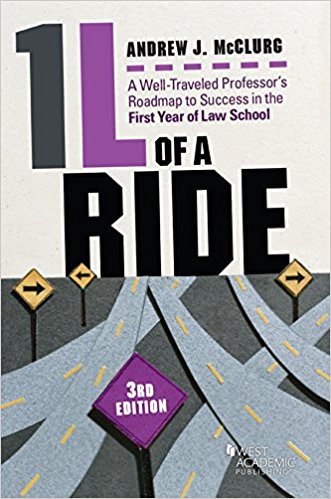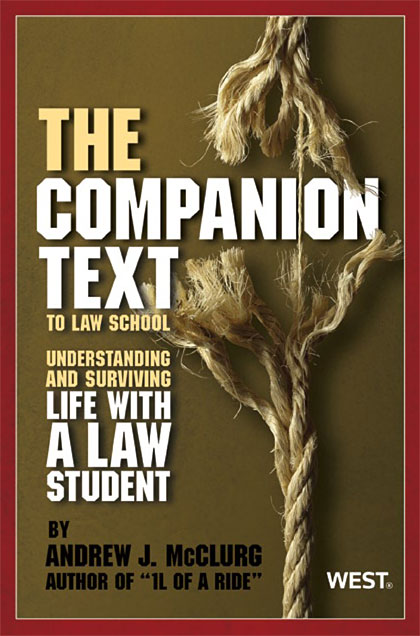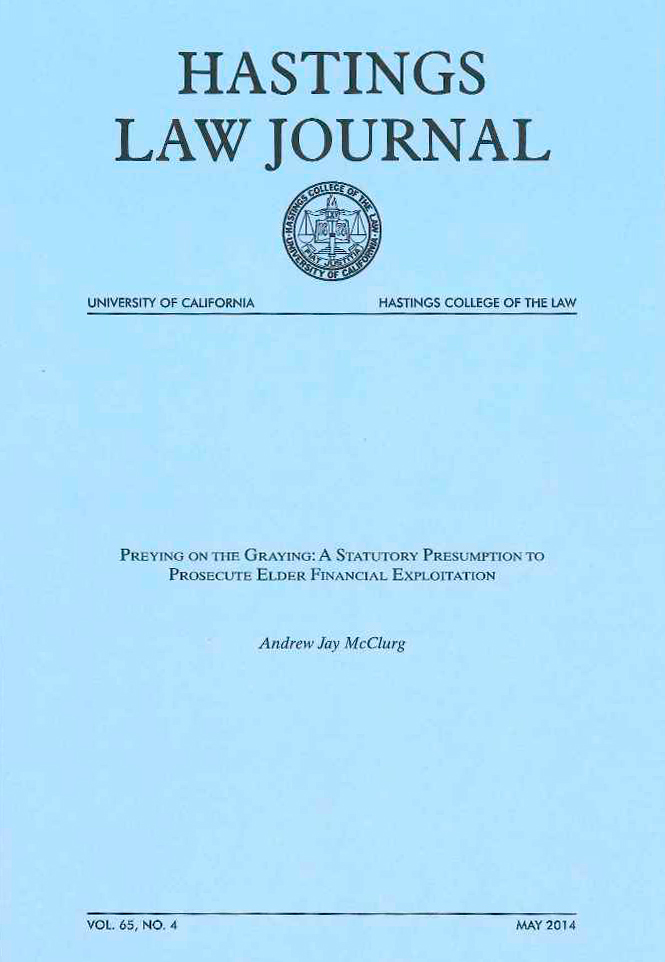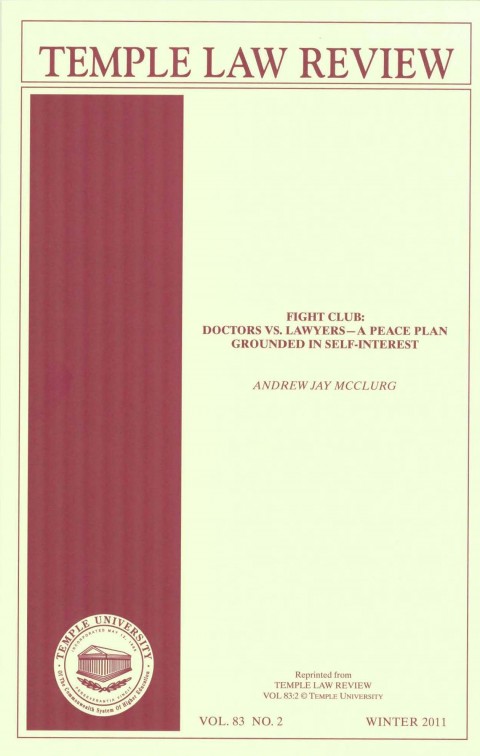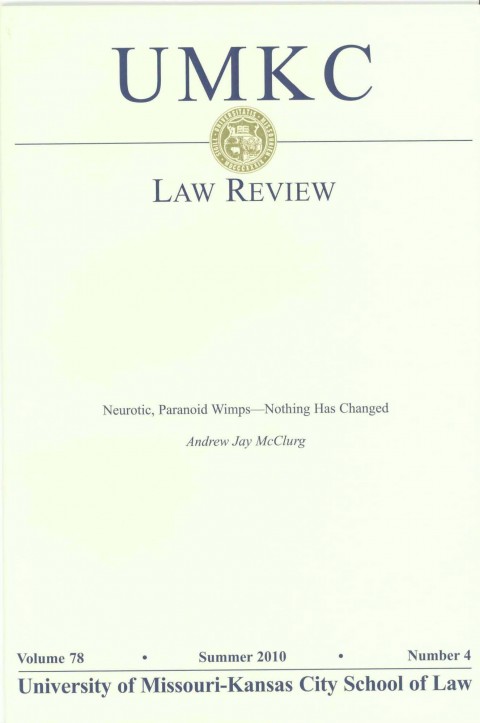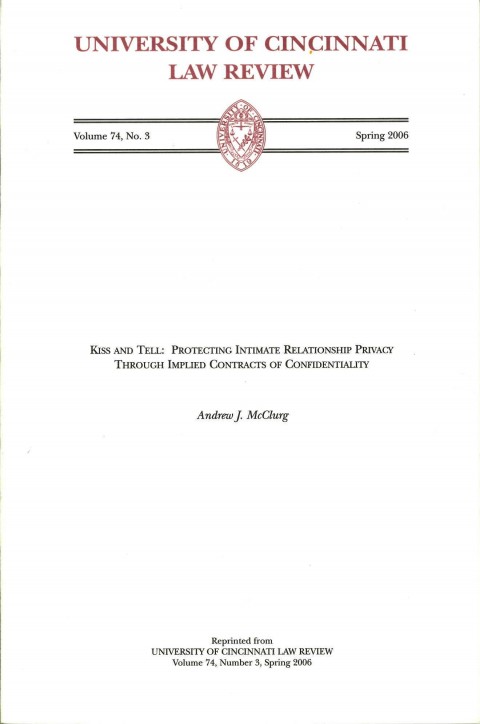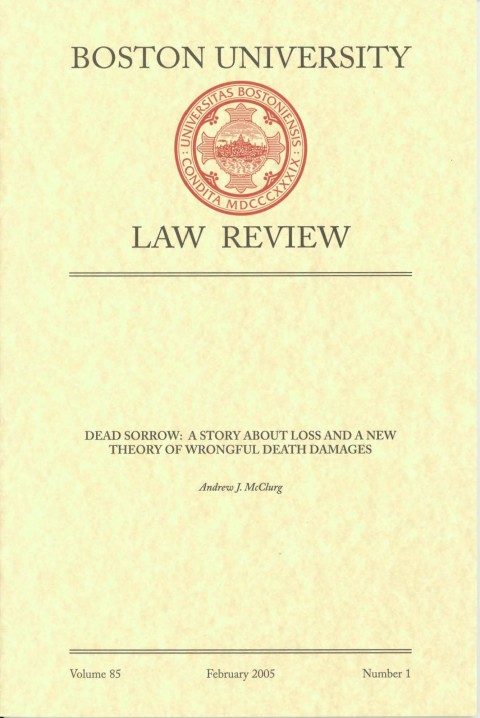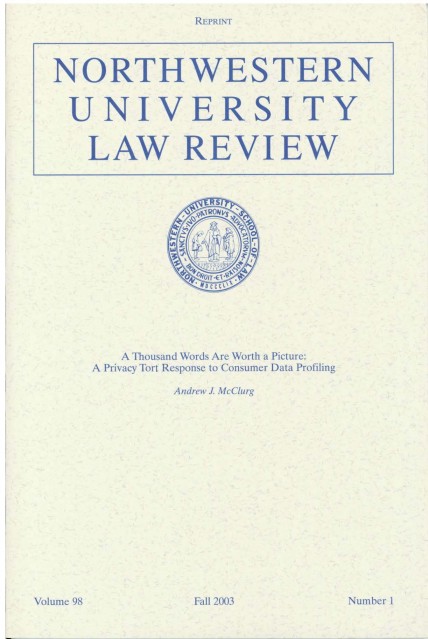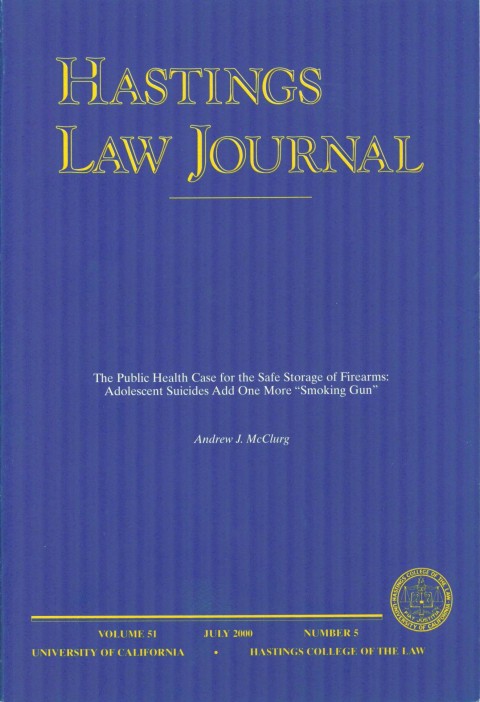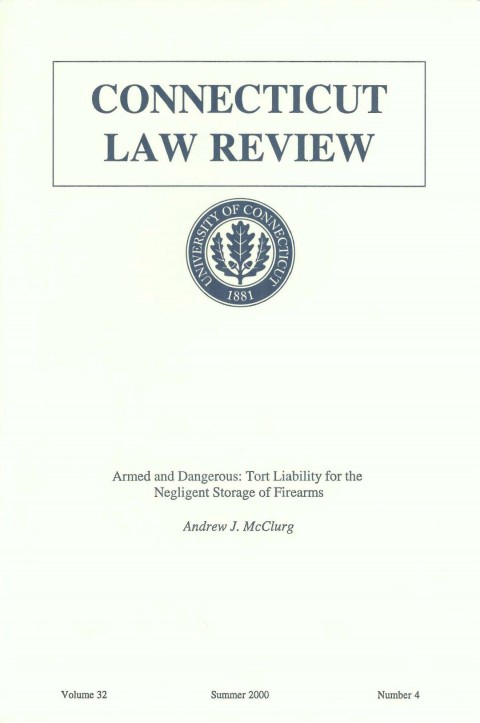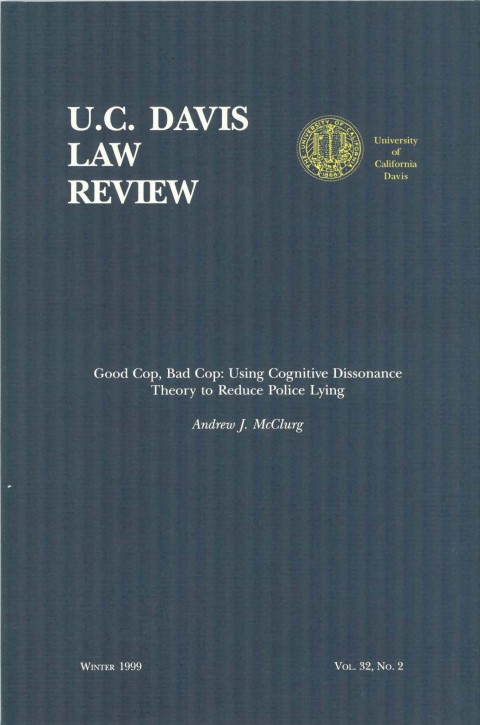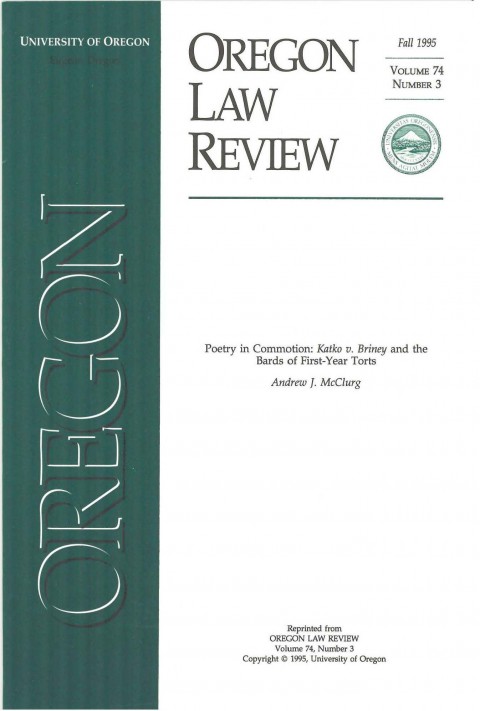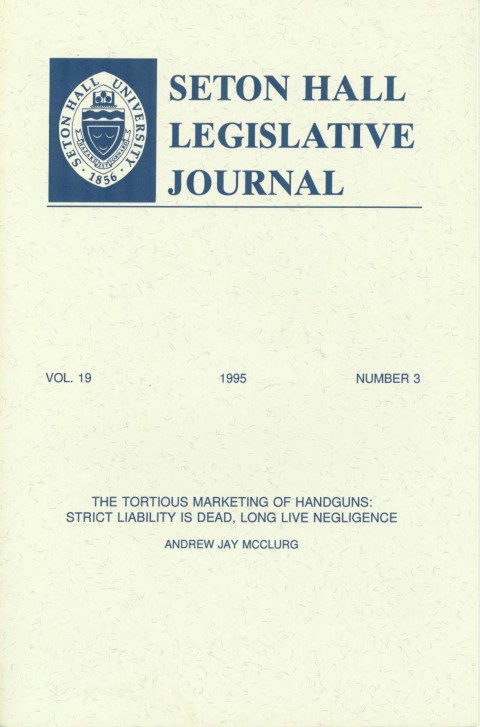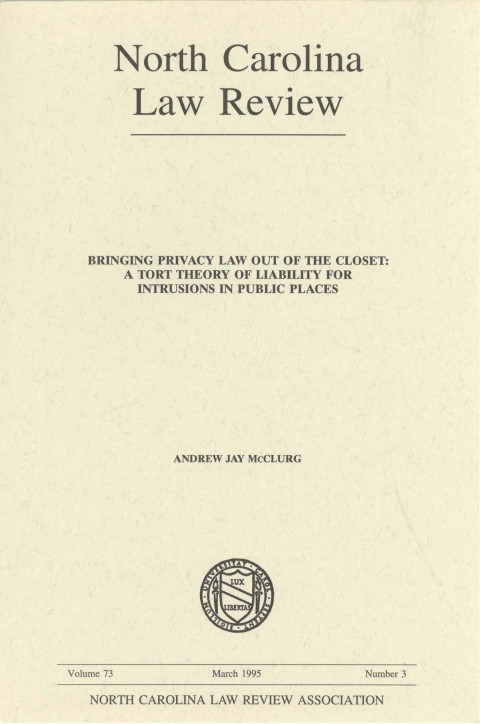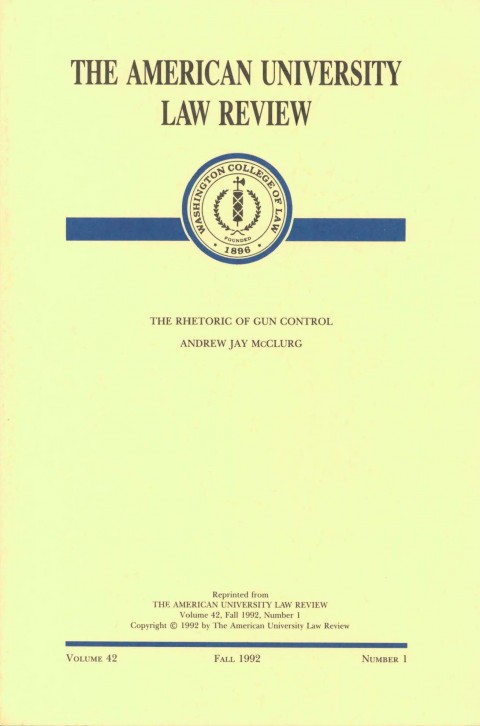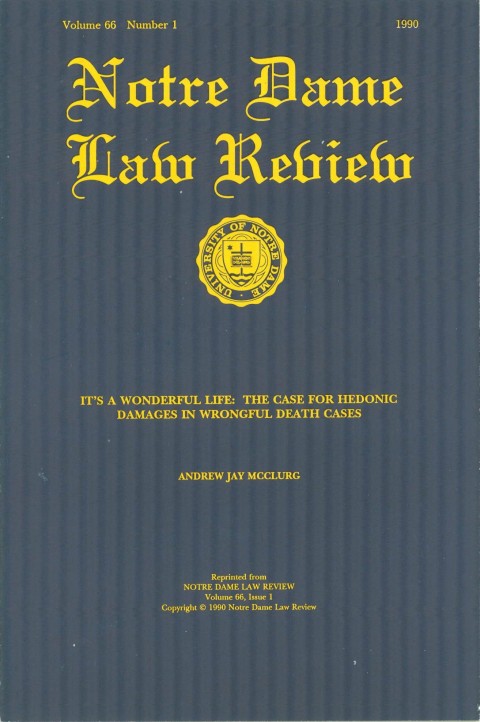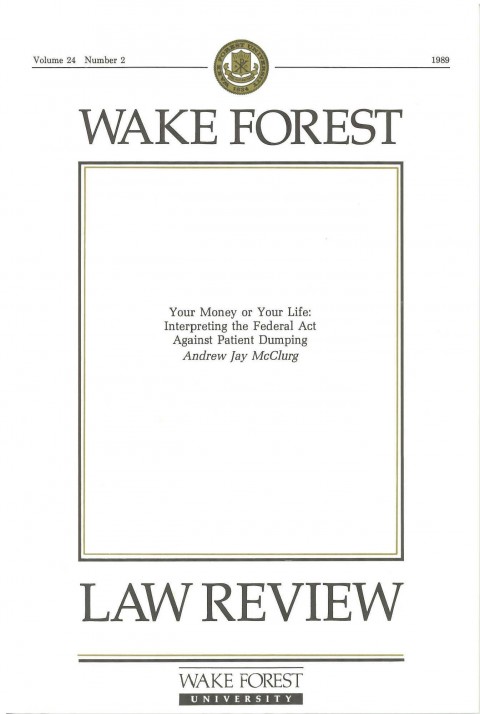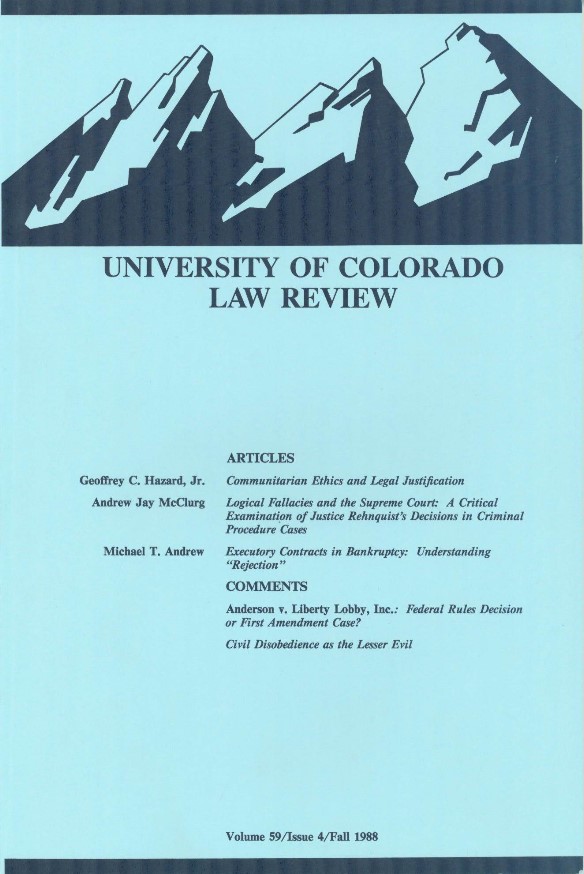July 5th, 2014 
And a whole lot of other undesirable results.
The World Health Organization (WHO) directs, in Article 11 of the WHO Framework Convention on Tobacco Control, that parties to the convention “implement large, rotating health warnings on all tobacco product packaging and labelling.”
The WHO website shows twenty countries (and their mandated warnings) currently participating, including Brazil, which is where the Florida International University law student who gave me this pack of Marlboros purchased it.
Some of the warnings are much more graphic.
Other countries mandate pictorial warnings without belonging to the WHO convention. In the United States, graphic pictorial warnings on cigarette packages were torpedoed by a lawsuit
Read more…
July 3rd, 2014 A former student of mine at the Florida International University College of Law sent this along, his entry for “Best Case Name of the Month.”
This month’s contestant is Wise v. Strong, 341 S.W.2d 633, 634 (Mo. Ct. App. 1960).
Spoiler alert: Strong wins. Strong always wins. *Tear.
Send along any entries you come up with!
–Thanks to Michael Hirschkowitz.
June 28th, 2014 “We live in a hideously unjust society where the only thing anyone cares about is oppressing precious, innocent children.” — Suzanne Marie Spikes
So proclaimed 11-year-old Suzy Spikes immediately before her parents imposed sentence in Spikes v. Spikes, Case No. 1,094,908, in which Suzy was charged with 48 counts of Bad Attitude with Intent to Act Like a Teenager. Just another day in the life of poor Suzy Spikes.
Check out Suzy’s world by clicking on the links below (or just scroll down). Make sure you’re well-insured and keep your lawyer’s number handy:
Sentencing Suzy ★ ★ ★ ★ (1998 Drama) Litigious
Read more…
June 25th, 2014 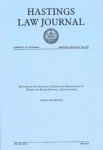
One doesn’t have to look far to find criticism of law professors for spending such a large portion of their time writing long, heavily foonoted, sleep-inducing law review articles. We even poke fun at ourselves for it, Exhibit A being The World’s Greatest Law Review Article.
But law review articles can and do have an impact. Have to share the good news that my proposal for a statutory presumption of elder financial exploitation in my recent Hastings Law Journal article, Preying on the Graying: A Statutory Presumption to Prosecute Elder Financial Exploitation, was signed into law by Florida Governor Rick Scott
Read more…
June 10th, 2014 
What Lawhaha.com calls “Rollin’ Torts” are so common they probably deserve their own subcategory in “Spot the Tort.” As will no doubt be defined in the next edition of the Oxford Dictionary, “Rollin’ Torts” are vehicles moving down the highway carrying items too big and/or unsecured to be moved safely in that fashion or by that vehicle. They are, literally, accidents waiting to happen.
Here, we have another great (meaning outrageously bad) example–in the pouring rain no less–courtesy of a 3L law student who, along with all her classmates, I taught to play “Spot the Tort” as a 1L.
–Thanks to Jessica Wargo.
Read more…
June 2nd, 2014 
Okay, this warning label, sent along by lawyer comic and insurance expert Randy Maniloff, does not actually cover turkey roasting, but maybe that’s because there wasn’t any room left after warning people not to toast their “Danish, Muffin [or] Cake” in the toaster.
But wait, what’s up with the warning to not put “Bread” in the toaster?
–Thanks to Randy Maniloff.
June 2nd, 2014 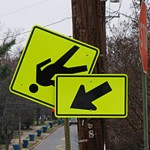
… at least that’s what these two signs seem to be indicating.
–Thanks to Gary Golden.
April 7th, 2014 
A while back I posted a picture of a coffee cup, reportedly from Canada, that made fun of U.S. tort law and, indirectly, poor Stella Liebeck, the plaintiff in the infamous McDonald’s coffee spill.
Now Chris Fergus, a professor in Australia, sends along this photo showing another coffee cup maker having a grand old time with the case by including a warning on its cups stating, “Avoid Pouring on Crotch Area.” I don’t speak French, but can guess the French version amounts to something like “Don’t Pour It on Your Oolala.” Chris said he received the photo from
Read more…
February 24th, 2014 
If you’re contemplating or applying to law school, boost your ability to maximize success with the highest-rated law school prep book, 1L of a Ride: A Well-Traveled Professor’s Roadmap to Success in the First Year of Law School. Read the Amazon Customer Reviews.
And don’t forget the loved ones. They’re in for an adventure too. The “Companion Text” to Law School: Understanding and Surviving Life with a Law Student is the only book written just for them. Named one of Amazon Editors’ Favorite Books of 2014.
Read more…
February 24th, 2014 
A student sent me this. Not sure where it was taken, but gotta love it. A much better attention-getter than the usual caution cones.
It raises the larger question of “Do people really slip on banana peels?” Yes. While slipping on a banana peel is a comedic cliché, it happens.
The famous Prosser, Wade & Schwartz Torts casebook contains a trilogy of cases involving plaintiffs who slipped on banana peels. In keeping with the comedic tradition, our discussion of the cases ends with this question: “Before we move on, what do the three banana cases all have in common?” Pause, bewildered looks. “They all went up on … a
Read more…
February 12th, 2014 
Friend of Lawhaha.com and legal cartoonist Mark Purdy has penned a cartoon raising an intriguing question that has long puzzled lawyers and rock music lovers alike. It’s purdy funny (ouch, sorry). So what’s your answer, are you “Pro Bono” or “No Bono”?
Pro bono legal work are services rendered by lawyers without charge to low income clients or otherwise in furtherance of the public good. (Pro bono comes from the Latin phrase pro bono publico, which means “for the public good.”)
Lawyers get a bad rap, but most non-lawyers probably do not realize that lawyers donate literally millions of hours of free legal services annually in the United States.
Read more…
January 26th, 2014 
I count at least six kids climbing on this dinosaur, one about to climb on, and maybe more if the dinosaur extends to those kids at the back, all in contravention of the warning sign:
PARENTS: Do not let Children Play or Climb on top of Dinosaur
The warning is emphatic and seems pretty clear, although perhaps the kid inside the mouth could hire Suzy Spikes to make a persuasive textualist argument that she is not technically “on top” of the dinosaur.
Looks like they need a second sign: “PARENTS: Read the sign that says to keep your kids
Read more…
January 19th, 2014 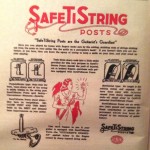
All guitar players have been painfully poked more than once by the sharp ends of the strings where they wrap around the tuners. In the 1930s, Kluson marketed “SafeTiString” tuner posts where the string ends could be neatly tucked away in a slot in the posts to “banish the peril of injured, cut or bruised fingers.”
Neat invention, but apparently too late to save the poor woman pictured in this advertisement reprinted in Vintage Guitar magazine in the Feb. 2013 issue. She appears to be bleeding to death.
Click to enlarge the thumbnail to appreciate her plight.
December 29th, 2013 
Lawhaha.com friend and South Florida resident Amy Holland is always on the look out to make the world a safer place. Here’s her latest effort:
Here’s a good spot-the-tort photo for you. We were at a liquor store, and as we were (separately) browsing the aisles, we each tripped over this object in the floor. Thankfully, neither of us was seriously injured, but tripping and stubbing a toe on this thing sure does hurt!
The object, which appears to be a doorstop, is made of heavy metal and anchored
Read more…
December 29th, 2013 
Long distance information, give me … ANYONE!
Can you spot the potentially tortious risk?
Contrary to Murphy’s Law, most things in life usually go right when it comes to risk and injury. Except in Tortland where the worst that can happen always does.
Picture a guest with an emergency, maybe a heart attack or a criminal attack. They reach for the emergency phone as instructed and … oops. No phone.
Easy fix: just take down the sign. No legal duty exists to provide an emergency phone in most situations, but one can assume a duty under tort law that would not otherwise exist by undertaking to render a service
Read more…
November 3rd, 2013 
Franklin, TN Lawyer Drew Justice, aka Captain Justice
This story has made the rounds but is worth repeating here if for no reason other than many of my current and former law students at the University of Memphis claim an association with Franklin, Tennessee lawyer Drew Justice, aka Captain Justice.
In a criminal case in which Mr. Justice represents the defendant, the government filed a motion in limine to prohibit the defense from referring to the prosecution as “the government,” asserting it was prejudicial. Justice replied that such a ban would violate the first amendment, but went on to argue, that should the court agree with the
Read more…
October 30th, 2013 
Randy Maniloff explores Halloween tort cases.
Insurance expert, stand-up comic, and friend of Lawhaha.com, Randy Maniloff, penned an interesting article in his latest issue of Coverage Opinions about whether people who get frightened at Halloween haunted houses, with resulting injury, can sue.
He writes:
On any other evening, presenting a frightening or threatening visage might be a violation of a general duty not to scare others. But on Halloween at trick-or-treat time, that duty is modified. Our society encourages children to transform themselves into witches, demons, and ghosts, and play a game of threatening neighbors into giving them candy.” Bouton v. Allstate Ins. Co., 491
Read more…
October 27th, 2013 
A student from my very first Torts course a million years ago sent me this brilliant flow chart for the tort of nuisance, which comprises substantial and unreasonable interferences with the use and enjoyment of one’s property. The most interesting thing about it is that it actually summarizes the law pretty well, assuming one has dropped acid before studying it. Credit on the chart attributes this work of art to one Margaret Hagen. Well done!
October 27th, 2013 
A 1L sent me this “Torts Illustrated” image, sort of a grown-up version of Garrett v. Daily, a famous case that all law students study in which a five-year-old was sued for pulling a chair out from under an elderly woman. If anyone knows the original source, please send it along so we can give proper credit.
In the meantime, one can only imagine what the swimsuit issue would look like.
September 24th, 2013 
Curious warning sign at the Beale Street Landing on the Mississippi River in downtown Memphis. It says:
Caution grass slopes may exceed 8%
Is “8%” meaningful information? Would it not be better to say “Caution: Steep Hill”?
Also, this is a multi-million dollar new development. Couldn’t they come up with a more professional sign. Maybe someone texted the sign maker:
btw, we need some signage for the slope, something like Caution grass slopes may exceed 8%. Why 8%? To mess with them! LOL
September 12th, 2013 
Andrew Jay McClurg, Preying on the Graying: A Statutory Presumption to Prosecute Elder Financial Exploitation, 65 Hastings Law Journal 1099-1144 (2014).
Already widespread and with seventy-eight million baby boomers in or nearing retirement, elder financial exploitation has been labeled “The Crime of the 21st Century,” yet little is being done to address the problem. While states and the federal government have passed hundreds of laws protecting children based on the assumption they are vulnerable and unable to protect themselves, older at-risk adults have been comparatively ignored despite extensive research showing they too are vulnerable.
A substantial roadblock to prosecuting elder financial predators is the inability to prove the
Read more…
September 11th, 2013 
Here’s a trivia question for lawyers and law students.
Question: What was the very first opinion issued in the U.S. Reports case reporter; that is, the opinion claiming that coveted number one slot of “1 U.S. 1” as a citation?
Answer: Well, it’s a bit of a letdown. You’d think they’d want to start with a bang, something Marbury-esque. But no, here’s the first case in the U.S. Reports:
The Lessee of Hyam and others v. Edwards
April Term, 1759.
1 U.S. 1, 1 Dall. 1, 1759 WL 20 (Pa.), 1 L.Ed. 11
Copy of a Deed inrolled in the King’s Bench in England, proved before
Read more…
August 28th, 2013 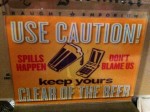
A recent graduate sent me this warning from a bar: “USE CAUTION! SPILLS HAPPEN … DON’T BLAME US … keep yours [your phone] CLEAR OF THE BEER.”
Nice! Makes nuclear power plant warnings pale in comparison. But then, those only involve radiation poisoning. We’re talking phone deprivation here.
–Thanks to Sarah Atkinson.
August 28th, 2013 The National Jurist interviewed me and a couple of other law school prep book authors in its September 2013 issue regarding happiness tips for new law students. Here’s the article:
The National Jurist – Sept 2013 McClurg Interview
August 14th, 2013 
A litigation strategy the judge thought went too boldly beyond …
In an order littered with Star Trek references, a litigation strategy involving obtaining the copyright to pornographic movies and then suing people for illegally downloading them irked U.S. District Judge Otis D. Wright (C.D. Cal.) to the extent that he levied hefty sanctions against those involved in various misdeeds.
According to Judge Wright, the plaintiffs had outmaneuvered the legal system:
They’ve discovered the nexus of antiquated copyright laws, paralyzing social stigma, and unaffordable defense costs. And they exploit this anomaly by accusing individuals of illegally downloading a single pornographic video. Then they offer to
Read more…
August 13th, 2013 
Overloaded vehicles, which we call “Rolling Torts,” are popular submissions on Lawhaha.com as shown here, here and here.
But if a contest were held, this one would have to take the prize.
–Thanks to Jill Magill.
July 23rd, 2013 Insurance law expert and humorist in his own right, Randy Maniloff, did a nice interview with me in the latest issue of Coverage Opinions, his bi-weekly electronic newsletter reporting and commenting on new court decisions addressing insurance coverage disputes.
He asked a lot of great questions covering everything from the state of product warnings the state of legal education.
Read it here: Coverage Opinions Interview July 24, 2013.
July 19th, 2013 
This very large sign in a Tennessee restaurant contends with the Tokyo Subway warning for The World’s Largest Warning, but it’s more interesting than that.
In the Southern United States, and perhaps in other parts of the country, it is popular for some restaurants to serve peanuts and encourage customers to throw the shells on the floor. Forget that it’s an unreasonable risk for a business invitor to have debris or other objects on the floor where customers are known to walk, or that slip and fall cases rank in the double digits percentage-wise among all tort lawsuits. It’s FUN to
Read more…
June 24th, 2013 
Is this the World’s Largest Risk Warning?
Persons and entities with a duty to warn of risks under tort law are often accused of hiding the warnings in the fine print or otherwise not making them sufficiently conspicuous. But the administrators of the Tokyo subway could never be accused of that, as shown in this mural-size slip and fall warning.
If there’s a Guinness Book of World Records entry for the largest risk warning, this one might contend. Good job, Tokyo subway.
Comparative Law Tangent: Many Americans think personal injury lawsuits are common only in the United States and attributable to far out U.S. tort law principles.
Read more…
June 21st, 2013 Someone sent a message in response to the Warning: Playing Stairway to Heaven is Prohibited post asking if I was making up the part about playing in Memphis rock cover bands. It’s true. As dubious as the proposition sounds, law professors can actually rock (or at least we think we can).
Below is a sample from our most recently disbanded band, The Vynals, having fun playing surf music at a festival outside of Memphis (a medley of Surfin’ USA by the Beach Boys and Wipeout by the Safaris). Wait, it gets even more incredulous. Now we’re forming The World’s Oldest Punk Band.
Read more…
May 26th, 2013 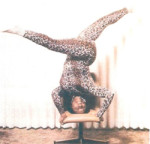
Federal judge a fan of this venerable exotic dancer.
Chief U.S. District Court Judge Fred Biery, W.D. Tex, had a great time writing a preliminary injunction order in a case in which the City of San Antonio passed an ordinance regulating topless dancers, including requiring them to wear more clothes. How much fun did he have? The title of the order gives a good clue:
“The Case of the Itsy Bitsy Teeny Weeny Bikini Top v. The (More) Itsy Bitsy Teeny Weeny Pastie,” with a footnote to—you guessed it—the novelty hit, Itsy Bitsy Teeny Weeny Yellow Polka Dot Bikini (Knapp Records 1960). The order is a combination
Read more…
May 24th, 2013 
As a hobby, I sing and play in Memphis rock cover bands. At the Young Avenue Deli in the Cooper-Young neighborhood of Memphis, the sound guy has a sign posted warning bands: “$20 Fine for Playing Brown-Eyed Girl or Mustang Sally.”
If you’re a music fan, you might be thinking, “Why? Those are both great songs.” They definitely are, which is why 90 percent of cover bands play them, which in turn is why sound guys hate them.
We encounter a similar phenomenon with guitar players. Every guitar player learns or tries to learn certain fundmental songs and riffs, including Stairway to Heaven (first song I ever learned back
Read more…
May 12th, 2013 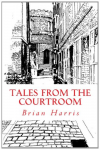
A new book, Tales from the Courtroom, by English lawyer Brian Harris offers an interesting mix of historical, mysterious and humorous legal vignettes, mostly of UK origin, but also including a few American tales.
The book includes a fair share of dark legal humor, such as the tale of a Scottish judge named Kames who in 1780 found himself trying Matthew Hay, his former chess partner, for murder. When the verdict of guilty was returned, Kames chillingly remarked, “That’s checkmate to you, Matthew!” (Harris points out that the statement must be read in a Scottish accent for full effect.)
One of the best historical tales involves F.E. Smith’s (Lord
Read more…
May 9th, 2013 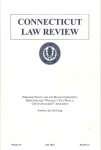
Andrew Jay McClurg, Firearms Policy and the Black Community: Rejecting the “Wouldn’t You Want a Gun If Attacked” Argument, 45 Connecticut Law Review 1773-1808 (2013).
The gun lobby has succeeded in focusing the gun debate on a narrow, oversimplified question: “If a criminal attacked you, wouldn’t you prefer to have a gun to protect yourself?” This article asserts that the question—which correlates with a “more guns” argument—is a red herring, a diversion that leads us off track and blinds us to the need for comprehensive strategies to address the complex, polycentric issues of gun violence in America.
In his article, Firearms Policy and the Black Community: An
Read more…
May 7th, 2013 –From Tony Arsenault, Laval University (Quebec), Date of event: Spring 2013
One of my friends took Legal Philosophy, a class whose teacher is known as a bit of a jerk and a little dismissive of lawyering as a profession.
They were discussing how to write the essay that was to be their final exam. Someone in the class asked: “Should we consider that the essay’s intended readers have any knowledge of law at all?”
The
Read more…
April 29th, 2013 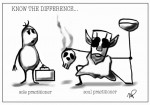
For funny and clever legally related cartoons, there is no beating Stu Rees and wife Maddy Dodson. But we always need more legal humor. Here’s a new sample from aspiring cartoonist, legal and otherwise, Mark Purdy. What do you think?
April 23rd, 2013 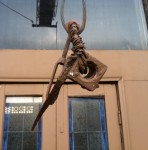
There are potential torts and there are POTENTIAL TORTS. This hanging rusty spike stands out even on the gritty, tort-filled streets and sidewalks of downtown Memphis. As you can see in the second picture, it’s hanging at a level where a person could walk right into it.
I snapped this shot on my way to the annual law review banquet a week ago and was surprised to see it still hanging yesterday on my way back from lunch.
The headline reference, of course, is to a line from the Rolling Stone’s Jumpin’ Jack Flash.
Read more…
April 16th, 2013 
You think this is bad, you should see how the guy tried to move his living room. Not the furniture, the entire room.
Why waste money on a delivery charge just to save a few million in accident costs?
–Thanks to Tommy Rogers
April 7th, 2013 
In Torts, we were talking about product warning defects and, particularly, the warnings found on most plastic bags. These are warnings to adults to keep plastic bags away from babies, cribs, etc. because they present a suffication hazard. Using various bags as examples, we talked about the efficacy of such warnings in terms of size, placement and whether they needed to be in multiple languages. (We also discussed whether the risk is obvious, in which case there would be no duty to warn of it.)
This week a student brought me a plastic bag that attempted to solve the efficacy problems by omitting written warnings and relying solely on pictorial
Read more…
March 24th, 2013 
When you were a kid, or maybe still, did you ever wonder why, no matter how hard you tried, you couldn’t reproduce the product results with your toys similar to those represented in the advertising? These failures caused massive wounds to self-esteem to millions of children. The examples are too many too count. Legos, Erector Sets, Lincoln Logs. How were we supposed to build that 10,000-piece castle on the box with fifty pieces?
At least one modern manufacturer is paying attention to protecting the egos of today’s youth via product warnings. Play-Doh warns kids, at least the ones who read product warnings, to not get their artistic hopes up because:
Read more…
March 1st, 2013 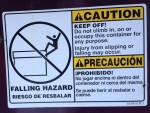
Can you interpret this pictorial warning?
The entertainment lawyer who sent it along thought maybe her landlord was warning tenants not to practice their parcours on the trash dumpster. “That stick figure is having far too much fun,” she wrote. “Look at his exuberant arms!
He definitely does appear to be celebrating a “Ta-Da!” kind of moment.
Remember: In evaluating a pictorial warning, you have to imagine you can’t read the textual warnings, either because you can’t read at all or can’t read English or other language the verbal warning is printed in.
This one rates only a 1.0 on Lawhaha.com’s proprietary 4.0 “Pictorial Warning Clarity” scale.
Read more…
February 23rd, 2013 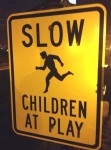
Slow down. The Incredible Hulk’s offspring may be playing in your neighborhood.
Hmm, maybe kids really are getting bigger. First, we had the titan-tyke falling from the diaper-changing station and now we have, courtesy of a first-year law student at the University of Memphis, this sign cautioning that children are at play. Very large children. Children who, judging by the picture, could contend in the decathlon at the Olympics.
–Thanks to Rob Clapper.
February 22nd, 2013 … to the tune of Peter, Paul & Mary’s “Where Have All the Flowers Gone?”
Lawhaha.com has collected funny law school stories from seventy-four law schools, but since the site was transformed into a WordPress blog, story submissions have dwindled. Must have something to do with the layout or maybe it’s the annoying CAPTCHA program on the Contact page, which requires people to type in those hard-to-read words as a spam-filter.
Whatever the reason, we know hilarity continues to unfold in the world’s law schools and want to preserve it here. Please send along your funniest law school moments for the comic and
Read more…
February 18th, 2013 
It’s always fun, fun, and more fun deciphering pictorial warnings.
Here’s a warning, along with a request, from a restaurant restroom in Naples, Florida: be careful not to let your baby fall off of the changing station, and also, don’t forget to throw away the dirty diaper! A good warning and reasonable request.
Remember, to interpret pictorial warnings, you have to imagine you can’t read the textual warnings below the symbols, either because you can’t read at all or can’t read English or
Read more…
February 16th, 2013 
Meteor damage: Coverage exclusion reason 51?
Insurance law expert Randy Maniloff shows that insurance law doesn’t have to be dry. His insurance coverage newsletter Coverage Opinions takes a light-hearted look at insurance, recently celebrating Valentine’s Day with a funny parody of a Paul Simon classic: “50 Ways To Leave No Cover,” an inventory of the many ways insurance companies manage to deny coverage. Here’s a taste:
There must be fifty ways
To leave no cover
Your notice was late Kate
And then you didn’t cooperate
That’s not an occurrence Terrence
Read more…
February 13th, 2013 A 1L at St. Thomas University School of Law in Miami wrote to say she enjoyed The “Companion Text” to Law School and especially connected to the chapter on the personality changes that occur in law students, specifically, becoming overly analytical. She gave a funny example:
I find it hard trying to switch gears back and forth from analytical law school mode to normal person mode.
We are trained to “think like lawyers” every waking
Read more…
February 11th, 2013 
Spotting torts, as we like to do here at Lawhaha.com, has its benefits as a pastime, but maybe a new “Fix the Tort” category should be added to “Spot the Tort.” After all, reducing risk, not just identifying it, should be the ultimate goal.
From sunny South Florida comes this picture of a downed stopped sign which, amazingly, the sender reported was fixed the same day it went down. Good job, city workers.
January 27th, 2013 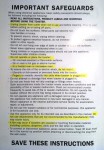
Like any heat-generating electrical device, toasters can be very dangerous.
Here’s the main warning page from a set of instructions for a new toaster (click pic to expand).
Most of these are good warnings, even if they sound silly. For example, “do not insert fingers … into slots when toaster is plugged in” sounds obvious, but how many toaster-users among us could swear under oath we haven’t fished stuff out of a plugged-in toaster with bare hands? One of the most common types of toaster injuries is burned fingers from trying to get Pop-Tarts out.
And on reading “Do not operate or place the toaster … in a heated
Read more…
January 16th, 2013 
It’s hard to tell in this warning if Apple was serious or trying to be amusing in admonishing consumers “Do not eat iPod shuffle.”
It seems jokey, especially because it follows the jokey tone of the instructions above, where it says that syncing the device will be “a piece of cake. Cupcake, even.”
No doubt Apple has a galaxy of outstanding legal advisors, so it’s surprising no one pointed out: “Never, ever make jokes in product warnings.”
Let’s assume hypothetically that the product seriously injured someone in a different way that should have been, but wasn’t, warned about, say, because the battery could explode. Picture the cross-examination:
Read more…
January 15th, 2013 
A first-year law student in Miami isn’t rushing out to buy these “career shoes.” As she explained in an email:
I am a member of a designer overstock/discount (and probably liquidation) club and was just browsing through today’s sales when I saw a heading that said “CAREER SHOES.” I clicked on it thinking I might find a pair of designer shoes suitable for pairing with a suit.
This photo shows their idea of career shoes for the modern woman. I do love a good pair of heels, but when I think of “career shoes,” I definitely don’t picture these styles … What’s the career they
Read more…
January 5th, 2013 
During a Torts class last semester, we were discussing various applications of Judge Learned Hand’s formula for negligence, when a student asked, “Why isn’t it negligent to hold pinata parties?” To which I replied, “It probably is!”
Judge Hand’s formula, explained in a famous case called United States v. Carroll Towing Co., is that if the burden of avoiding a risk is less than than probability of the risk resulting in harm multiplied by the potential severity of the harm, it is negligent to engage in the conduct.
As applied to pinata parties, the only burden to avoiding the risk is to choose a different, safer game to entertain
Read more…
January 3rd, 2013 
A former student from Golden Gate law school who lives and practices in Hawaii sent this picture of a true torts-loving person’s car.
We will engage in outrageous speculation that it belongs to a plaintiffs’ personal injury lawyer. If you think about it, who else would get a “TORTS” license plate? Maybe geeky law professors with nicknames like Tortman or pattisiers who can’t spell, but really no one else. Insurance defense lawyers wouldn’t do it because it would violate the industry position that torts do not actually exist.
The car owner obviously loves tort law, but any challenger to the “Most Crazy in Love with Torts” still has to
Read more…
December 11th, 2012 People sometimes (infrequently, slightly more often than “not ever”) ask how I got started writing legal humor.
It was a steaming summer afternoon back in 1995. I sat in my law school office sweating footnotes. Frustrated by the strictures of law review writing requiring that every sentence be documented in a–preferably lengthy–footnote, I snapped. Exiting the article, I dashed off The World’s Greatest Law Review Article, a heavily footnoted parody of real law review articles.
Not knowing what to do with it, I sent it to the American Bar Association Journal. They published it (Oct. 1995, pp. 84-85) and The World’s Greatest Law Review Article struck a chord. Someone
Read more…
December 7th, 2012 
Reprinted from The “Companion Text” to Law School: Understanding and Surviving Life with a Law Student (West 2012) with permission from Thomson Reuters:
Question. In 2003, the American Film Institute (AFI) released its list of the top fifty heroes in movie history. How many of those top fifty movie heroes were legal professionals (lawyers or lawmakers) or common citizens who used the law to achieve progressive objectives?
A. 1
B. 4
C. 8
D. 12
E. 15
For the answer …
Read more…
December 2nd, 2012 
If you come here often, you know we love pictorial product warnings. Pictorial warnings are intended to explain product dangers in a universal symbol or picture that can be universally understood even by people who cannot read or who speak and read a different language.
Here we have a pictorial product announcement on the back of a rug indicating the company uses no child labor. Very commendable.
The test for a pictorial symbol is whether it communicates its intended message without textual explanation. So take away the “No Child Labor” words and what do you see? A “No Happy Children” warning.
Not quite sure why the manufacturer felt it
Read more…
November 27th, 2012 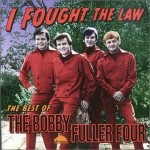
Reprinted from The “Companion Text” to Law School: Understanding and Surviving Life with a Law Student (West 2012) with permission from Thomson Reuters:
Question. While some people purport to “hate” lawyers, the public remains fascinated by them, as evidenced by all the attention the legal profession receives in the entertainment world. Since the 1960s, more than fifty television series about lawyers have been produced. Well over 100 “lawyer movies” have been brought to the big screen and lawyer novelists such as John Grisham sell hundreds of millions of books. What about musical entertainment? Which of the following is NOT a real song by a popular artist?
A. I Fought the Law (and the Law Won)
B. Lawyers in Love
C. Sue Me, Sue You Blues
D. My Lawyer Bit My Doctor
E. Lawyers, Guns & Money
For the answer …
Read more…
November 25th, 2012 
Okay, that’s probably not the original message of this crosswalk sign, found on the University of Florida campus, but a sense of urgency was added when someone doctored the sign by adding a can of Red Bull … and angel wings?
November 13th, 2012 
One of the milder pictures of Stella Liebeck’s coffee burn injuries.
Any mention of lawsuits and hot coffee invariably invokes the grossly misunderstood “McDonald’s coffee spill” case of Stella Liebeck, a 79-old-woman who suffered third-degree burns after spilling a stryrofoam, takeout cup of McDonald’s coffee on her legs.
I apologize for the gruesome picture, but a large part of the misunderstanding of this case comes from people not appreciating that Ms. Liebeck suffered extremely severe injuries. There are much worse pictures of her injuries available on the internet. There is also a ton of information, and misinformation, out there about the McDonald’s case. Here (scroll down
Read more…
November 12th, 2012 
Law schools, filled as they are with lawyers and law students, are pretty safe places, but they sometimes present their own dangerous premises issues, as here in a University of Memphis classroom where students were trying out some new technology that has not reached the wireless stage. The result: a spider web of trip and fall possibilities. Thanks to Rachel Cade.
November 7th, 2012 
Pictorial warnings are intended to explain product dangers in a universal symbol or picture that can be universally understood even by people who cannot read or who speak and read a different language.
Unfortunately, coherently explaining product risks usually is hard to do in a single image. A picture may be worth a thousand words, but product warnings can be better explained in words (unfortunately, many litigation risk-averse product makers insist on using the full thousand or more, but that’s a different issue).
Here we have a pictorial warning about hair rubberbands. As the written part of the pictured warning shows (all thumbnails are expandable), they can present a
Read more…
October 26th, 2012 
In this Halloween-themed case, the plaintiff bought a house, only to learn that it had a reputation in the Village of Nyack, NY, for being possessed by poltergeists, a reputation built in large part on the seller’s previous efforts to promote the house as haunted, which were unknown to plaintiff. On learning of the alleged haunting, plaintiff sued for rescission of the sale contract.
The New York Supreme Court, Appellate Division, over one dissent, ruled for the plaintiff, going against the usual rule in New York of strict caveat emptor (let the buyer beware), which imposed no duty on house sellers to disclose even known defects. Based on the
Read more…
October 22nd, 2012 
Getting in the Halloween spirit, I was in a drug store reading warning labels for Halloween products and came across this Grease Makeup. Looks like fun stuff, right? Not as fun as you might think.
Read more…
October 16th, 2012 
You thought “Risk” was a good game? Spotting risk is even more fun, and definitely more educational. As law students learn in Torts, the world is a dangerous place where the worst that can happen often does.
My 1Ls at the University of Memphis have been participating in a “Spot the Tort” Contest. Check out their photo entries. This is just one sample of the “accidents waiting to happen” they’ve documented in and around Memphis.
October 8th, 2012 
Are you in law school? Do you consider yourself to be a dedicated law student? Not sure? Measure yourself on McClurg’s simple 0-100 scale, with 0 being “I’m not totally thrilled with Judge Learned Hand” and 100 being “I aspire to be like the guy in this picture.”
Years ago, a student of mine at the University of Arkansas at Little Rock School of Law took a trip, to Philadelphia, I think. He struck up a conversation with a tattoo artist in a bar. When the artist learned he was in law school, she asked, “Have you ever heard of a judge named Learned Hand?” “Of course!” the student
Read more…
October 4th, 2012 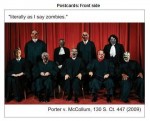
Good news for legally inclined zombie lovers. Joshua Warren has compiled a casebook on Zombie Law that “include[s] case opinions from the over 300 U.S. Federal Court opinions with the word “zombie” (and “zombies”, “zombi”, “zombis”, “zombified”, “zombism”, etc..).” These include cases from the zombified Supreme Court (available as postcards, along with zombie law teeshirts and zombie flashdrives).
Warren explains that this is a “serious” project. From his promotional website:
The “zombie” in federal courts are very interesting. Aside from the intellectual property cases that provide some reflection on modern zombie fiction, there are also ample metaphoric uses of the word in these judicial writings. Judges
Read more…
September 24th, 2012 
Betting the professor was this federal judge’s favorite Gilligan’s Island character.
In an opinion that is part period-piece shipwreck thriller and part Gilligan’s Island pop-culture fun, Chief U.S. District Judge William Steele (S.D. Ala.) attempted to unravel a dispute over the ownership rights to an unidentified shipwreck off the coast of Alabama. The wreck is believed to be either the Clipper Ship ROBERT H. DIXEY or the British barque AMSTEL.
Several parties, including the United States and Alabama, claimed title to the wreck. Unfortunately, whichever ship it was, it sank more than 150 years ago, leaving Judge Steele to observe in a footnote that historical scholars were
Read more…
September 21st, 2012 
“I am just a nowhere man, falling into nowhere land, stepping through the balcony doors to nowhere.”
With apologies to the Beatles, that’s the tune that came to mind on receiving this picture of a second floor balcony with nowhere to go but down at a resort at Pickwick Lake in Tennessee.
The submitter said the doors open inward. While the railing no doubt helps, the open space at the bottom is still a tort waiting to happen.
September 17th, 2012 
In this class action against T-Mobile for allegedly reactivating stolen phones after they were reported stolen, the plaintiffs invoked a recipe metaphor from another case, but the U.S. Court of Appeals for the Eleventh Circuit turned it around on them. The court opined the closest the plaintiffs came to explaining the trial court’s alleged error
is when they quote (in their reply brief) a metaphor from an opinion in another case: “Just as one bad ingredient can spoil a stew, one error of law can spoil an order.” Gray v. Bostic, 625 F.3d 692, 697 (11th Cir. 2010) … [Explaining Gray as a case where the error
Read more…
September 5th, 2012 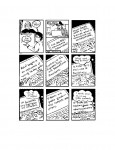
Thanks to Lawahaha.com friend Bob Van Voris of Bloomberg News for sending along a true first: an amicus brief filed in a complex intellectual property dispute in the U.S. District Court for the Southern District of New York comprising only comic strip panels.
(You can get a taste by clicking on the expandable thumbnail, but this gem deserves to be read in full.)
Limited by the court to filing a brief of five pages, Bob Kohn took out his frustration by deciding to simplify the complex arguments in comic book form.
The brief is made up largely of a cartoon-bubble conversation between a man and woman (Kohn and his
Read more…
September 3rd, 2012 
Andrew Jay McClurg, Book review: Philip K. Howard, Life Without Lawyers: Restoring Responsibility in America, 52 American Journal of Legal History 387 (2012).
Contrary to the title, Philip K. Howard’s Life Without Lawyers is not an anti-lawyer screed. It does not argue for a society without lawyers and suggests only in passing that America has too many lawyers. A more apt title would be “Life Without Rules” or maybe “Life Without Law.”
Howard argues that America’s enormous inventory of laws and bureaucratic rules is crippling society by making it impossible for people and institutions to do their jobs effectively. His opinion is that the primary reason is because
Read more…
September 2nd, 2012 
Fight Club: Doctors v. Lawyers, Chicago Medicine, June 2012, at 8 (cover story).
This article, a shorter version of an article first published in the Temple Law Review, argues that doctors and lawyers have strong shared self-interests that should motivate them to improve their bitter relations, while offering several specific examples of ways to accomplish that goal.
Among other things, the article traces the history of medical malpractice litigation in the U.S. Did you know that the first reported medical malpractice case occurred in 1794 and that lawyers were first called sharks by doctors in 1878? Here’s an excerpt:
Relations
Read more…
August 26th, 2012 
From a University of Memphis law student comes this photo of a treacherous, spiral staircase that looks like it would be a perfect set piece for a low-budget version of a Harry Potter movie. The student said the whole staircase, not just the railing, “wobbles all the way down.”
Spooky. And dangerous.
Seriously. Stairs, like ladders and any other place a person can fall from height, can be extremely perilous. One recent study found that 931,886 children under five were treated in emergency rooms for stair-related injuries from 1999 through 2008, averaging 93,189 injuries per year.
Speaking of Read more…
August 17th, 2012 
Court of Appeals used this guy’s tunes to find humor in alleged gun assault.
One rule of thumb regarding amusing judicial opinions is that the higher up the judicial hierarchy one climbs, the fewer such opinions one encounters. But here we have the distinguished U.S. Circuit Court of Appeals for the Eleventh Circuit, per Judge Ed Carnes, having fun with a case that probably wasn’t amusing from the plaintiff’s point of view, assuming the allegations of his complaint are true.
As alleged: A mother, a state corrections officer, came home in uniform to find her daughter and plaintiff engaging in intimate relations. The complaint alleges she pulled
Read more…
August 11th, 2012 
Banana Slugs – Mascot for U.C.-Santa Cruz
[Judge Terence T. Evans, U.S. Court of Appeals for the Seventh Circuit, passed away in 2011. Here’s a nice tribute to him on the Marquette law school (where he attended law school) faculty blog.]
In an opinion involving controversy over “Chief Illiniwek,” mascot of the University of Illinois since 1926, Judge Terence Evans of the U.S. Court of Appeals for the Seventh Circuit once again showed his dominance as the nation’s premiere judicial sports buff.
A group of students and faculty who believed the mascot degraded Native Americans brought suit against the university chancellor, seeking a declaratory judgment that
Read more…
July 24th, 2012 
One of my colleagues was amused and bemused by this warning sticker inside the shower stall of her hotel room during a vacation to Norway:
Warning.
The bathtub can be slippery. Anti-slip mats are available at our housekeeper.
Please dial 7000.
Hmm, if the bathtubs are slippery, shouldn’t they already have mats in them? And isn’t it a bit too late to be dialing up the housekeeper for a mat once you’re already in the bath?
July 14th, 2012 
One of Zim's classics.
Remember “Golden Guides”? They were sort of the original “Dummies” series for kids, explaining a variety of scientific, geographic, and nature topics in succinct terms understandable even by 10 year olds.
Zim v. Western Pub. Co. arose out of a dispute between the guy who wrote or co-wrote many of these masterpieces—Dr. Herbert Zim—and the Golden Guides publisher, Western Publishing. Zim penned such classics as Rocks and Minerals, Reptiles and Amphibians, Trees, and my personal fav, Fishes.
Judge Goldberg of the U.S. Court of Appeals for the Fifth Circuit apparently also thinks highly of Zim, elevating him to biblical proportions:
Read more…
July 10th, 2012 
Courtesy of a rising 2L at the University of Memphis law school, we have another failed attempt at conveying warnings and instructions via pictorial symbols.
In evaluating pictorial warnings, remember that the principal purpose of pictorial warnings is to convey warnings to people who can’t read or read in a different language. If people could read the warnings, we wouldn’t need the pictures.
Thus, interpreting only the pictures, here’s what a non-English speaking park visitor might take away from these four frames of a sign warning about how to handle mountain lion attacks:
1. Top left: “After lion has bitten off your right hand, run AWAY from the lion.
Read more…
July 6th, 2012 
Siskel and Kozinski?
Judge Alex Kozinski, of the U.S. Court of Appeals for the Ninth Circuit, was well-known for his sparkling prose in writing opinions, but his most classic opinion was U.S. v. Syufy Enterprises, in which he weaved in more than 200 movie titles.
In Syufy, the federal government sued Las Vegas movie-chain owner Syufy for antitrust violations. In affirming the trial court’s dismissal of the antitrust charges, rumor had it that Judge Kozinski wove more than 200 movie titles into the text of his fourteen-page opinion.
But did it really happen? Was it urban legend? Bourbon legend?
It really happened. Daniel Solzman of the Tarlton
Read more…
July 4th, 2012 
Legal research shows no Lannister has ever filed for bankruptcy.
Good legal news if you’re a fan of HBO’s Game of Thrones series, adapted from George R.R. Martin’s medieval fantasy novel series, A Song of Ice and Fire. The series centers around the struggles of several noble families, including the Lannisters, whose unoffical motto is that “A Lannister always pays his debts.”
Now comes breaking news out of South Florida. A former student at the Florida International College of Law, a really smart one named Michael Hirschkowitz, has, through painstaking legal research, confirmed the apparent truth of the Lannister motto.
He reports: “There are 0 cases
Read more…
June 30th, 2012 
When manufacturers overwarn, it dilutes the impact of warnings that consumers really need to know about. Over-warning is a serious problem — not to be confused with global-warming, which is also really bad.
Given some of the silly and dangerous ways consumers misuse products, one can have sympathy for manufacturers that don’t want to take chances. I’ve done consulting work writing product warnings and instructions for manufacturers and confess that I advise erring on the side of giving too many warnings.
But to waste space and, more importantly, short consumer attention span on worthless warnings that lead with telling consumers to:
1. Read these instructions.
Read more…
June 24th, 2012 Maybe there should be an opposite abbreviation to TMI such as NEI (not enough information).
In a case involving a challenge to nuclear waste fees at a site intended to replace the Yucca Mountain disposal site, brought to our attention by way of The BLT: The Blog of LegalTimes, the U.S. Court of Appeals for the District of Columbia admonished the lawyers – in the attention-stealing first footnote no less – for using too many acronyms:
1. We also remind the parties that our Handbook of Practice and Internal Procedures states that “parties are strongly urged to limit the use of acronyms” and “should avoid using acronyms
Read more…
June 21st, 2012 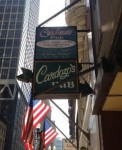
Two drink minimum; No packages wrapped in newspaper.
A student of mine posted this pic on Facebook of “Cardozo’s Pub” in Chicago. Is “Andrews’ Billiard Hall” next door by any chance?
For non-legals, Judge Benjamin Cardozo is one of the most famous American jurists. He authored several judicial opinions read by law students, including the majority opinion in Palsgraf v. Long Island Railroad. Judge William Andrews wrote a famous dissent in the same case.
Palsgraf, studied by every first-year law student, is the improbable tale of a set of scales allegedly knocked on top of the plaintiff, Mrs. Helen Palsgraf, as a result of an explosion that
Read more…
June 19th, 2012 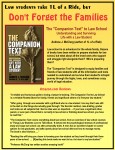
Always read the fine print.
The start of another academic year is closing in quickly. If you’re going to be a new law student, you’re not the only one who needs to get ready for a wild ride.
Dozens of books have been written to prepare students for law school, but The “Companion Text” to Law School is the only book ever written to prepare the families and friends of law students for what to expect and how to deal with it.
Check out some review excerpts on this new flyer.
Read more…
June 17th, 2012 
Whatever happened to “Appellant wins”?
Back in 2003, in McConnell v. Federal Election Committee, the U.S. Supreme Court cleared up a major legal dispute over campaign financing. Er, well, maybe not completely cleared up.
The basic question was whether the McCain-Feingold Act, a federal statute that imposed restrictions on political contributions, violated the First Amendment free speech rights of potential contributors. A challenging issue no doubt, but certainly not too tough for the mighty U.S. Supreme Court to resolve, right?
With nine justices voting, the result could have been as simple as 8-1, 7-2, 6-3, or 5-4 in favor of one side or the other. The nine
Read more…
June 13th, 2012 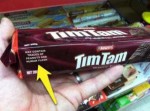
A Facebook friend posted this picture of a candy wrapper, featuring the warning:
MAY CONTAIN TRACES OF PEANUTS AND HUMAN FLESH
Not sure where he got it or if it’s real. It doesn’t look Photoshopped (but it’s hard to tell sometimes).
Human tissue does sometimes end up in food products during the manufacturing process, probably more often than we would want to know.
My favorite “flesh in food” cases is a 94-year-old Mississippi Supreme Court case where the plaintiff found a human toe in a plug of chewing tobacco. That’s one way to “kick” the habit. Har, har.
The plaintiff couldn’t prove how the toe got there,
Read more…
June 9th, 2012 
Former Michigan Supreme Court Justice Eugene F. Black
Thanks to Graham Bateman for turning Lawhaha.com on to a real character: Justice Eugene F. Black, a judge whose inflammatory dissent-writing makes caustic U.S. Supreme Court Justice Antonin Scalia’s dissents read like love letters in comparison.
Black regularly lashed out at his colleagues on the Michigan Supreme Court, on which he served from 1956-72, holding their feet to the fire when he saw their actions as reckless, destructive, deceptive, partisan, or willful.
For being so outrageous in his outrage, and for having such a sharp, articulate poison pen, Justice Black lands in the Strange Judicial Opinions Hall of Fame.
Read more…
June 3rd, 2012 
Triple Crown threat Funny Cide caught up in weird judicial opinion.
The total weirdness of Florida Court of Appeals Judge Farmer’s opinion in Funny Cide Ventures, LLC v. Miami Herald Publ’g Co. gets the case into Lawhaha.com’s Strange Judicial Opinions Hall of Fame.
Here’s a first in judicial writing: an appellate judge writes an opinion in an offbeat fiction-style based on a tune from Guys and Dolls, can’t get the other judges to go along with his approach, so decides to attach his creative opinion to the court’s per curiam opinion together with a lengthy preface explaining his unique approach to written adjudication.
Confused? Let’s back up.
Read more…
May 31st, 2012 
When paint is not enough, add a warning cone, but do not, under any circumstances, consider actually repairing the dangerous condition.
Good news! Well, kind of, sort of. Visitors might recall the treacherous sidewalk abyss adjacent to a busy Memphis street that I regularly walk on. The first attempted fix was to spray orange paint around the edge.
But maybe someone broke their leg despite that aggressive risk-reducing measure, because now the city has a new fix: an orange cone! Cement apparently is still not being considered.
But, oops, we also have a
Read more…
May 27th, 2012 
Bird expert "thinks" this might be a bird.
In U.S. v. Byrnes, the defendant was convicted of making false statements to a grand jury investigating illegal trafficking in exotic birds. The issue involved the materiality of statements as to whether some illegally imported swans and geese were dead or live when the defendant received them.
To bolster its case, the government called a collector of Australian parrots who testified the defendant had delivered some swans and geese to her. Defense counsel cross-examined the witness, an immigrant from Germany who had difficulty speaking English, in an apparent effort to challenge her credibility as a bird expert. Here’s the
Read more…
May 13th, 2012 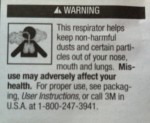
The goal in crafting a pictorial product warning is to come up with a picture that can be universally understood, even by people who speak different languages or are illiterate. But it’s darned difficult to capture most warnings in the form of a simple drawing.
Case in point: this warning on a 3M paint-fumes mask. You’ve seen or used these before. They are paper masks held to one’s face with rubber bands that go behind the head.
But what is this pictorial warning trying to say? The accompanying text helps, but, again, the whole idea of pictorial warnings is that they are supposed to be understandable even by people
Read more…
May 11th, 2012 U.S. Seventh Circuit Court of Appeals Judge Terence T. Evans, who passed away in 2011, was well-known for his opinions jammed with sports trivia (see here and here).
But in a criminal case involving witness tampering and “too many Murphys” (the defendant, his son and the trial judge were all named Murphy), Judge Evans mined a different pop culture-vein in an opening footnote necessitated by a court reporting error in the trial transcript:
1. The trial transcript quotes Ms. Hayden as saying Murphy called her a snitch bitch
Read more…
May 11th, 2012 
When Marc Cohn sang, “Walkin’ in Memphis, walkin’ with my feet ten feet off of Beale,” he may have been giving risk avoidance advice.
Good old Memphis, a streets-and-sidewalks tort mecca.
These photos were taken a couple blocks from Beale Street in downtown Memphis.
Walk a hundred steps, spot a tort. Walk another hundred steps, spot a tort. And so on.
May 4th, 2012 Thanks to Professor Laura Heymann, College of William & Mary-Marshall-Wythe School of Law, for sending along her funny parody of intellectual property law in the form of a cease and desist letter sent from one neighbor to another complaining about infringement of the offended neighbor’s parenting directive to “Eat your frisee salad.”
Laura’s satirization of overly aggressive assertions of intellectual property rights–all too common these days–brought back memories of my Harmless Error column in the ABA Journal, The© Controversy, in which the heirs of a Homo erectus Peking Man cave dweller sought to compel me to cease and desist in using the word “the.”
May 4th, 2012 
A student snapped this photo of a food vending truck in Memphis, where a customer is perched precariously on some portable steps placing an order. The steps should be both longer and wider for stability and to avoid missteps and missed steps. On the other hand, give the vendor credit for the safety cones.
April 18th, 2012 A judge friend sent me this handwritten Texas divorce petition, apparently filed back in 1985 by a Texas lawyer proceeding pro se. It’s one of those hand-scrawled pleadings that, at first blush, looks like it was written by an inmate or perhaps a crazy person; however, closer examination shows the writing to be quite clever and amusing in places. And the drawings are priceless.
The petitioner seems uncertain of where his heart lies, as he alternates between insulting the wife and telling the court how much he loves her.
Read the original to appreciate it, but here are some re-typed uncorrected highlights (the respondent’s name and petitioner’s address are
Read more…
April 14th, 2012 
iTunes software is good stuff for downloading the latest crappola that the recording industry is outputting (editorial comment courtesy of a music lover still stuck in the 60s and 70s), but just remember that iTunes software is:
[N]ot intended for use in the operation of nuclear facilities, aircraft navigation or communication systems, air traffic control systems, life support machines or other equipment in which the failure of the Apple software system could lead to death, personal injury, or severe physical or environmental damage.
April 13th, 2012 
Here’s an interesting warning, from a former student at Florida International University College of Law.
The warning is on the outside of a toilet compartment on a recreational boat. I think I know what it means, but surely they could have worded it better.
April 7th, 2012 
The next time someone raises the age-old debate as to whether a tomato is a fruit or a vegetable, show off your legal acuity (or nerdiness) by informing them you have it on good authority that tomatos are vegetables. No, in fact, make that great authority. Who? The U.S. Supreme Court. More than 100 years ago, in Nix v. Hedden, Justice Horace Gray, speaking on behalf of a unanimous Supreme Court, ruled that a tomato is a vegetable as a matter of law.
Read more…
April 4th, 2012 
“Excuse me, I’d like to have a few words with you about the litter box issue.”
Miles v. City Council of Augusta, GA—starring “Blackie the Talking Cat”—is our kind of case: completely WEIRD, so weird that it qualifies for Lawhaha.com’s Strange Judicial Opinions Hall of Fame.
The plaintiffs, Carl and Elaine Mills, were an unemployed, married couple who owned Blackie, a cat who could allegedly speak English. The plaintiffs were entrepreneurs in the true American mold, making their entire living marketing Blackie’s unique vocal abilities to the public. Although the closest Blackie ever came to making the big time was a $500 appearance on “That’s Incredible” in
Read more…
April 1st, 2012 A pro se litigant in Arkansas appealed a trial court decision granting custody of her child to the biological father and ordering that the child’s birth name be changed. The trial court granted the custody change and ordered the child’s name be changed to “Samuel Charles.” Not a bad name, but why order a change? Personally, I liked the original name: “Weather’By Dot Com Chanel Fourcast.”
For making us laugh out loud, this order gets into the Strange Judicial Opinions Hall of Fame.
Here’s the colloquy in which the perplexed trial judge asked the mother to explain the child’s birth name:
The Court: I simply do not understand
Read more…
|
Funny Law School Stories
For all its terror and tedium, law school can be a hilarious place. Everyone has a funny law school story. What’s your story?
|
Product Warning Labels
A variety of warning labels, some good, some silly and some just really odd. If you come encounter a funny or interesting product warning label, please send it along.
|
Tortland

Tortland collects interesting tort cases, warning labels, and photos of potential torts. Raise risk awareness. Play "Spot the Tort." |
Weird Patents
Think it’s really hard to get a patent? Think again.
|
Legal Oddities
From the simply curious to the downright bizarre, a collection of amusing law-related artifacts.
|
Spot the Tort
Have fun and make the world a safer place. Send in pictures of dangerous conditions you stumble upon (figuratively only, we hope) out there in Tortland.
|
Legal Education
Collecting any and all amusing tidbits related to legal education.
|
Harmless Error
McClurg's twisted legal humor column ran for more than four years
in the American Bar Association Journal.
|
|
|























































































